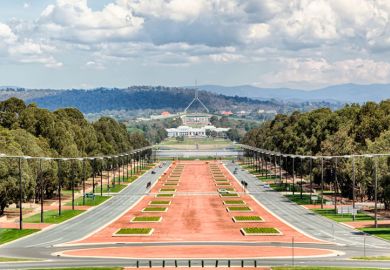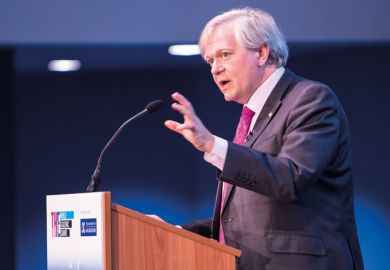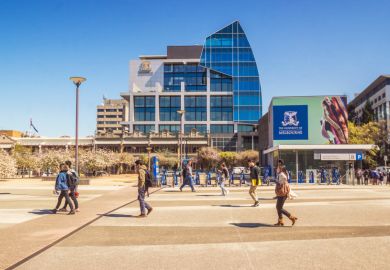Brian Schmidt is one of only a handful of academics to have won a Nobel prize then switched to leading a university, taking over at the Australian National University last week. And there cannot be many other Nobel prizewinners who run a vineyard, or many other vice-chancellors who describe the salaries of their counterparts as “high” and pitch their own at a level where they hope not to be seen as an “outsider” by staff.
As an astronomer who shared the 2011 Nobel Prize in Physics “for the discovery of the accelerating expansion of the universe through observations of distant supernovae”, US-born Professor Schmidt must have left behind a research career where any option was open to him.
But he saw leading the Canberra institution, where he had conducted research since 1995, as “a great opportunity to use the Nobel prize, and what I’ve learned and the things I’ve seen and done, to have an impact that affects thousands of people rather than just myself”, he told Times Higher Education.
Speaking to two other Nobel prizewinners who went on to lead universities – Sir Paul Nurse, who was president of Rockefeller University, and J. Michael Bishop, who was chancellor of the University of California, San Francisco – helped him “suss out whether I could do this job effectively”.
“Universities are very hard to lead,” Professor Schmidt said. “They are made up of 1,000-plus people who are brilliant but very independent. You have no ability to really fire them; you can only convince [them] that what we are trying to do collectively is the right thing. My stature actually, I think, makes that easier.” He has a range of “experience that helps me relate to a wide variety of people”, he added.
Professor Schmidt would not disclose his salary, but said that “ultimately I’m doing this job because I love the institution”.
In terms of his salary, he wants “people to know that I’m part of the university”, that “I am still a scientist”, he said. “And I don’t want to be considered to be the outsider, because then I cannot do my job.”
PhDs, young talent, and pinot noir
Professor Schmidt said that he was “still remunerated at a very high level from my perspective”.
“But I do think, especially here in Australia, vice-chancellors’ salaries are high,” he continued. “Maybe they are appropriate. But in my case it’s a special university and I’m keen to make sure it [the salary] is something that makes sense.”
Asked about areas where he might seek change at the ANU, Professor Schmidt said: “There are a variety of things that are done in Australian universities, including the ANU, that I think are 50 to 70 years out of date.
“It includes the structure of our PhD, the idea of how students tend to commute to campus here and leave – I’d like them to have a real communal experience here on campus – [and] it involves the way we teach. The world’s been lecturing for 800 years, but it’s very clear that with the new technology we can improve how we do that.”
The ANU would be focusing on “new young talent” in research, Professor Schmidt said. He added that he wanted to see “big, game-changing results – those are often done by young people”.
Australia’s Liberal-led government, under new prime minister Malcolm Turnbull, has shelved plans to deregulate fees.
“Pure fee deregulation I have some misgivings with”, said Professor Schmidt, adding it “would have bankrupted” the government’s income-contingent loans scheme.
But given factors including the lack of a “quality driver” on teaching, he said the status quo is “a long way away from being optimal” and welcomed the government’s commitment to “rethink the ideas” for change.
Professor Schmidt was also a spokesman for the Mainau Declaration 2015 on Climate Change, signed by 36 Nobel laureates. The message of the declaration, he said, was that “the scientific processes of the world have spoken. They’re not perfect, but they’re the best thing we have and they say ‘danger’”.
Professor Schmidt has been running his Maipenrai vineyard and winery, near Canberra, with his family since 2000.
Dedicated to making pinot noir, Professor Schmidt proudly noted that the 2009 vintage was described as “very respectable indeed” by Jancis Robinson, one of the world’s leading authorities on wine.
Asked whether he has previous management experience, Professor Schmidt highlighted his chairing of the board of Astronomy Australia, which manages infrastructure, along with his wine venture.
He believes the “principles are the same” in running this “small business”, although running a university is “a big step up in scale”.
The winery has other benefits as a “great place to think”, Professor Schmidt said. “There’s 168 hours in a week. You’ve got to do something other than just sit in your office.”
POSTSCRIPT:
Print headline: Physicist to ‘use Nobel prize’ for wider benefits as v-c
Register to continue
Why register?
- Registration is free and only takes a moment
- Once registered, you can read 3 articles a month
- Sign up for our newsletter
Subscribe
Or subscribe for unlimited access to:
- Unlimited access to news, views, insights & reviews
- Digital editions
- Digital access to THE’s university and college rankings analysis
Already registered or a current subscriber?









